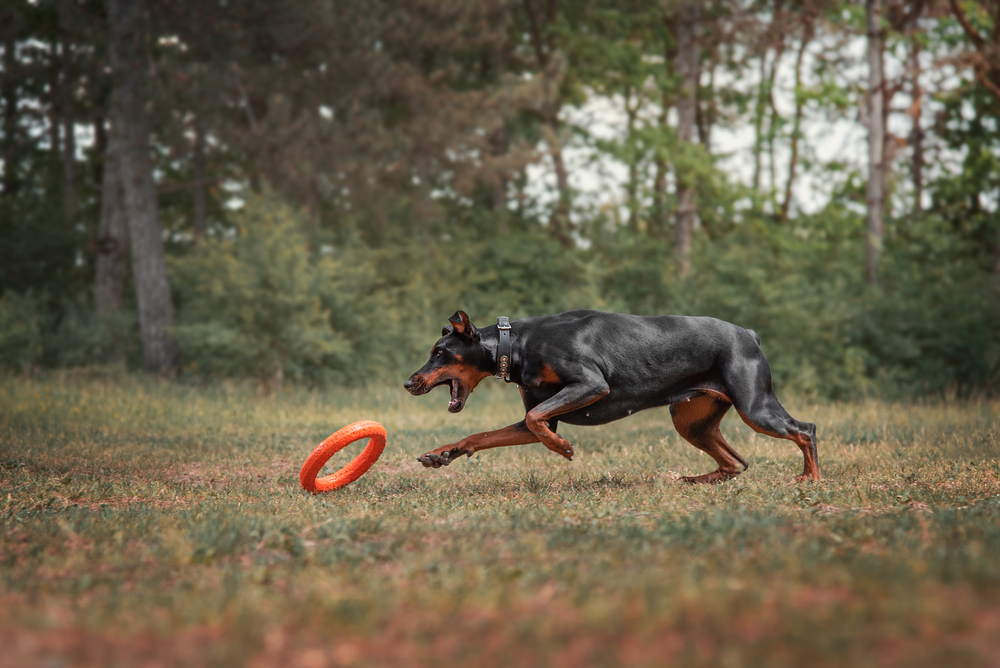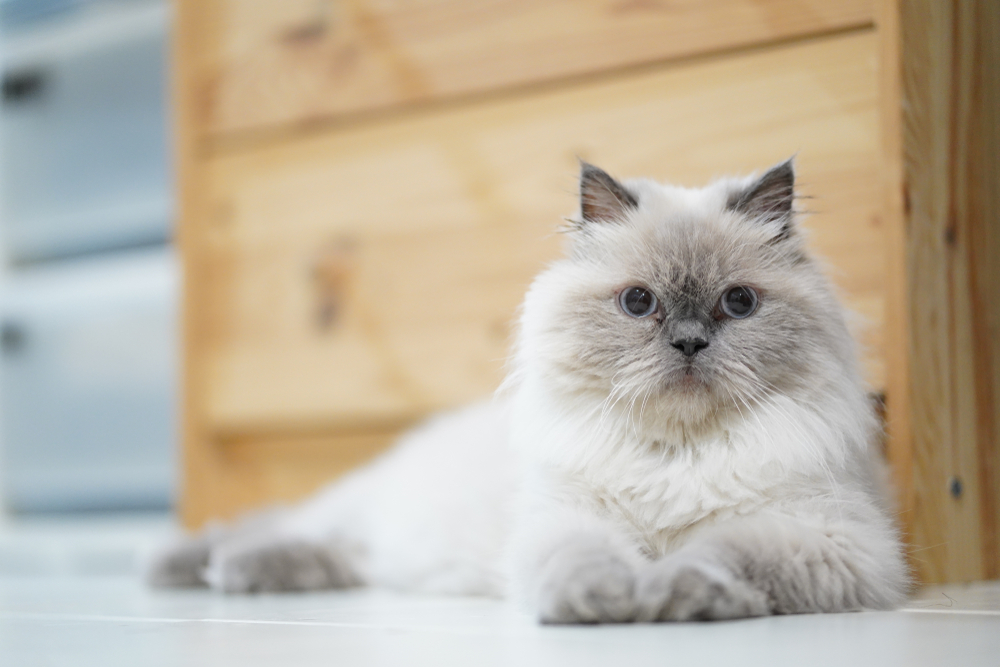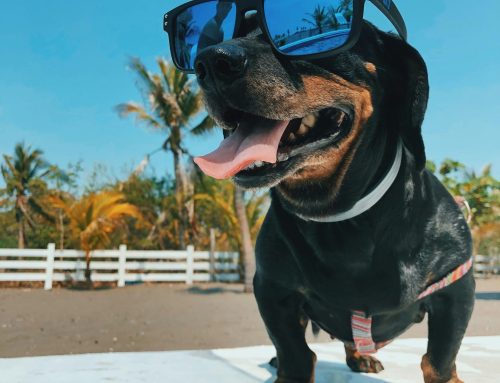Does your pet have a little grey around their muzzle? As your dog or cat reaches their senior years, you may have to provide them with extra care for their age-related issues to help ensure your furry pal remains happy and healthy. Our Companion Care Animal Clinic team consulted with some elderly four-legged experts to find out how you can best help your pet enjoy their golden years.
Hattie the Himalayan says, “When I reached my 10th birthday, my owner started taking me in for twice yearly wellness visits to ensure age-related conditions, such as kidney disease, are detected early when they are easy to manage.”
Regular wellness care is critical for all pets, especially senior pets who are at an increased risk for health issues such as kidney disease, heart conditions, diabetes, and thyroid issues. Your senior pet’s recommended wellness care may include:
- Blood work — Routine, screening blood work, including a complete blood count (CBC) and biochemistry profile, help our team detect issues such as anemia, infection, diabetes, electrolyte abnormalities, and liver or kidney disease.
- Urinalysis — A urinalysis provides helpful information about your pet’s overall health and can help us detect issues such as kidney disease, urinary tract infections (UTIs), and urinary calculi.
- Thyroid panel — Senior dogs have an increased hypothyroidism risk, while senior cats have an increased hyperthyroidism risk, and we may recommend a thyroid panel to ensure your senior pet’s thyroid is healthy.
- Professional dental evaluation — Poor dental health affects most pets by 3 years of age and can significantly decrease their life span. Professional veterinary dental evaluations and cleanings are the only ways to diagnose and treat periodontal disease appropriately to prevent the condition’s negative effects.
- Vaccinations — Keeping your pet up-to-date on their vaccines continues to be important as they reach their senior years. Our team will devise an appropriate vaccination schedule for your aging four-legged friend.
- Parasite prevention — Year-round protection against heartworms, fleas, ticks, and intestinal worms is also essential for your senior pet, and our team will recommend a product best suited for your senior furry pal.
Bernard the beagle says, “My weight started to creep up when my muzzle started to turn grey, and my owner made some changes to my diet to ensure I stayed at a healthy weight.”
Overweight and obese pets are at an increased risk for health issues such as cancer, arthritis, diabetes, and hypertension. To help keep your senior pet at their ideal body condition and as healthy as possible, follow these tips:
- Requesting a nutritional consultation — Your pet’s nutritional needs change as they age. Ask our Companion Care Animal Clinic team if your furry pal might benefit from a senior-specific pet food.
- Avoiding free feeding — Free feeding increases your pet’s obesity risk, because dogs and cats typically eat until their bowl is empty. Calculate the number of calories your pet needs each day so you can give them the appropriate food amount and help prevent weight gain.
- Avoiding portion guesstimation — Eyeballing your pet’s meal portion size can lead to overfeeding or underfeeding. Use a measuring cup or kitchen scale to measure your pet’s portion size accurately.
- Choosing healthy treat options — Rather than feeding your pet packaged high-fat treats, give them vegetables and fruits (e.g., snap peas, baby carrots, green beans, blueberries) and small pieces of lean meats. Remember to limit your pet’s treats to no more than 10% of their daily caloric intake.
Sidney the Siamese says, “My owner noticed that I stopped resting in my favorite spot on top of the refrigerator. He took me for a veterinary evaluation, and I was diagnosed with arthritis. Treatment to alleviate my joint pain and home modifications greatly improved my quality of life.”
Arthritis commonly affects senior cats and dogs, but the issue often goes undiagnosed and untreated because you may associate your pet’s behavior changes with normal aging signs. Pets’ arthritis signs include stiffness, especially after resting, decreased interest in play, increased resting time, difficulty jumping on or off elevated surfaces, exhibiting an awkward gait or resting position, and irritability. If your pet has arthritis, we recommend you do the following to manage their signs effectively:
- Administer pain medications — Our team may recommend pain medications, such as non-steroidal anti-inflammatories (NSAIDs), to help alleviate your pet’s joint pain and inflammation.
- Monoclonal antibody treatment — Your arthritic pet may benefit from a once-monthly monoclonal antibody treatment.
- Home modifications — Home changes can also help improve your arthritic pet’s quality of life. Consider these home modifications:
- Placing stairs or ramps near your pet’s preferred elevated resting areas.
- Elevating your pet’s food and water bowls to prevent painful eating and drinking postures.
- Placing slip-proof rugs on uncarpeted floors to provide traction.
- Ensuring your pet has comfortable places to rest by providing orthopedic, supportive bedding.
- Providing low-sided litter boxes to help your senior cat get in and out.
Dorothy the Doberman says, “I started getting a little forgetful right after my 7th birthday. My owner made a few changes to help keep my mind sharp.”

Senior pets are at risk for developing cognitive dysfunction, a condition similar to Alzheimer’s disease. Keeping your pet mentally and physically active can help reduce their risk and slow disease progression. To help keep your pet’s mind sharp, follow these tips:
- Feed your pet with a food puzzle toy, so they have to use brain power to get their meal.
- Take your pet for brisk walks, choosing different routes each day.
- Use a wand-style toy or laser pointer to exercise your senior cat’s mind and body.
- Teach your pet a new trick.
- Provide your pet interactive toys, and rotate them to prevent your pet from becoming bored.
- Play games such as hide-and-seek. Another effective way to interact with your pet is to hide treats around your home and let your furry pal practice their nosework skills.
Schedule your senior pet’s wellness visit with our Companion Care Animal Clinic team, and help ensure your dog or cat enjoys their golden years.







Leave A Comment